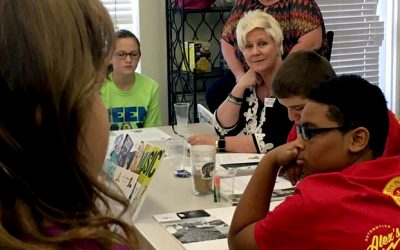Turn on the news during this pandemic, and examples of leadership, good and bad, are there for all the world to see. From local officials trying to balance the health of their constituents while protecting the future of their community; to military officers at odds over how to care for sick service members; to business leaders, small and large, trying to navigate their way through this crisis; to state and federal leaders balancing infrastructure needs with messages of hope.
Listen to one, and you find a leader living in the truth, offering comfort while delivering facts, actionable advice, and up-to-date information people need to make informed decisions in their own lives. These leaders are making sacrifices to bring people together, modeling what people need to see and hear in this time of crisis. Flip over to another channel and you find lack of clarity, obfuscation, and self-serving politics. A leader bragging about their personal wins, while placing blame and casting aspersions on other people.
These two scenarios are being played out in board rooms and offices, at clinics, bases, and ships and on conference calls across the world even as you read this. Leaders making decisions based on thinking that will inspire and motivate their people or push them closer to fear and anxiety.
As leaders, we all want to encourage and strengthen the people around us, especially in times of crisis when hope feels so distant. Where do we begin? How do we know if what we’re thinking and doing will motivate and inspire, or cause fear and distraction? John C. Maxwell offers this as a baseline:
“You know you’ll make the right decision when you put people first.”
When we put people first, we actively listen, strengthen connections, gain traction, and build momentum with a contagious vision informed by faith and energized with hope. As leaders in a crisis, we need to model this, living out an example that will help our team focus, connect, and move forward in unity.
This starts with us, because we’re more effective when we’re focused and healthy ourselves. In a world defined by the solitude of social distancing, we have a lot of time to think. What we choose to think about makes a huge difference.
In a crisis, if we’re not aware and not intentional, there are many things that may hijack our thinking. With the 24-hour news cycle almost entirely dedicated to pandemic coverage, delivered through every possible media option, just trying to separate the important data from the noise and the fear is exhausting. Trying to do so when our thinking is already clouded with fear and worry is even more taxing. Being effective leaders in a time of crisis begins with protecting our thoughts. We know this threat is real. We’re worried for good reasons, and we all need to be intentional about seeking wisdom and filling our minds with truth.
Experiencing worry and anxiety about living in a time of pandemic and what the consequences will be, now and in the future, is natural.
Many of us know people who are sick. Some of us know people who have died because of COVID-19. We’re all grieving. And, with the constant stream of conflicting and changing information, we’re all working out who to trust… and how much to trust them. Our faith in humanity, in the system, and in ourselves is being tested. Our team members are doing the same; and they’re looking to us while asking similar questions.
Prioritizing Self-Care
With all the distractions, all the fear and worry and stress, it’s hard to focus, especially when we feel responsible for others. Self-care slips down our list of priorities, even though we know taking care of ourselves is necessary for us to show up for our loved ones and those we lead. To help us be intentional about self-care, the CDC suggests these steps to manage the roller coaster of emotions and the weight of worry that comes with living through a crisis.
- Take breaks. Schedule them if you have to. Turn off the news, stop the flow of negative information. Step away from social media and completely unplug.
- Take time to breathe, stretch, and to meditate.
- Slow down, especially for meals. Eat a healthier, well-balanced diet.
- Exercise daily and get a good night’s sleep.
- Avoid self-medicating with alcohol or drugs.
- Relax. Do something that makes you smile and helps you focus.
To this, I would add:
- Share your concerns and fears with people who appreciate your honest, authentic self, in an environment where neither of you will make judgements.
- Be an intentional connector. Call family and friends, share something positive and ask them to do the same.
- Celebrate together. Grief will come, and being joyful together will help sustain us.
Focused, faithful, and connected
Right now, there is so much vying for our attention, fragmenting our focus and threatening to leave us scattered, distracted, worried, and apathetic. For most leaders, apathy is not a familiar state of mind. However, in a crisis, many people, including many leaders, just hit a wall. We experience a version of what caregivers call “compassion fatigue.” With so much continual stress and worry, coming from so many directions without a break, our natural desire to lead is slowly replaced with fatigue, boredom, and even cynicism.
All of this is exacerbated by the continual distractions. In addition to the task distractions we manage on a daily basis, we have additional mental, emotional, and financial worries… and, worse, we have no idea when we may experience relief. Most of us realize, on some level, our world is forever changed, and we don’t know what it will look like on the other side of this crisis.
Effective leaders are intentional about protecting, feeding, and encouraging their minds. We know that distractions are the actions that pull us away from all we want in life. We understand that gaining traction is the first step in building momentum toward that life, and yet all these distractions are happening that grab hold of us and pull us back. We break free and move forward when we:
- Strengthen connections to people and things that inspire and energize us
- Maintain focus on what we want our lives to be
- Remain faithful to our beliefs, truths we know will not change no matter the circumstances
- Practice intentional empathy
No matter how many times we are distracted, no matter how many times we slip off course, stand up, and start moving forward again. Focus on one thing and get it done. Do not allow the distractions, even other worthwhile tasks, to distract. Get that win and focus on the next. Encourage others to do the same, whether they’re working with us, for us, or on their own. Celebrate those wins and allow that joy to energize our momentum.
We know this crisis isn’t going anywhere, anytime soon, and that means stress, distraction, fatigue, and grief will still be with us. When we’re intentional about our focus, walking in truth, and keeping our life-giving connections strong, we will find our way through and show others how to do the same.
Do you have the one thing every successful leader has in common?
To develop as a successful leader, you need a strong support team around you to lift you up, encourage you, challenge you, give you some direction and help you along the way. That team should include one or more people who builds trust, models positive behaviors and...
4 key leadership truths
I’ve been blessed to have some tremendous mentors throughout my life and my career. They helped me develop my outlook, my confidence and my approach to leadership development. Today, I am still blessed to have many great mentors, including my husband, my siblings,...
2 little changes that make a big difference
When you come up against a challenge or things aren’t going well it can be tempting to look at roadblocks and see mountains, to see pits to get stuck in and not hurdles to leap over. You begin to worry so much about getting stuck … you end up just as stuck.Sometimes...
Find the hidden leaders on your team
You want to equip and inspire the leaders on your team and attract more leaders, but you have limited resources, and you’re not always sure who you should choose. After all leadership is not always about having the best brain, perfect personality … or the squeakiest...
Delegate your weak spots to someone’s strength
Last time we talked about why the best leaders focus on building up their strengths rather than worrying about their weaknesses. I’ve heard from several of you, asking an important question: “What if my weaknesses are blocking my success?” Great question. This is...
Why leading from your strength yields better results
Some leaders spend way too much time worrying over or working on their “weaknesses” rather than leading from their strengths. These leaders often wonder why they don’t have any time to do what inspires them. They struggle to inspire and effectively connect with...
Why Some Leaders Aren’t Successful
It doesn’t matter what industry they’re in, who they lead or what they sell. This trait is a universal indicator of success. Look at where these leaders were last year and look at them today. All of these leaders will have
Breakthrough – Discovering My Why
When you don’t know what you don’t know, the best place to start is with people who have been where you are and may be able to see more clearly. For me, that meant finding a mentor and reading the best books about life and business I could get my hands on. These...










0 Comments